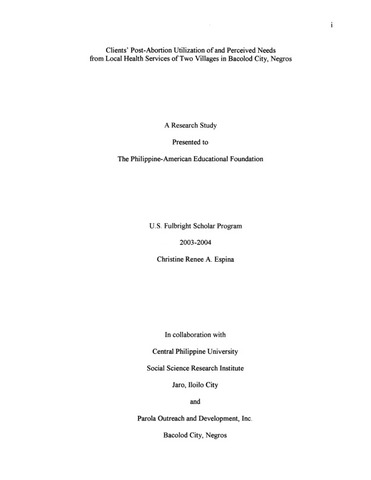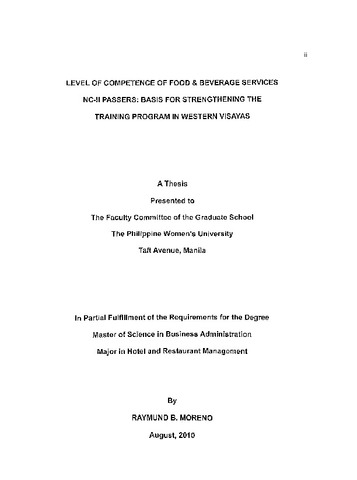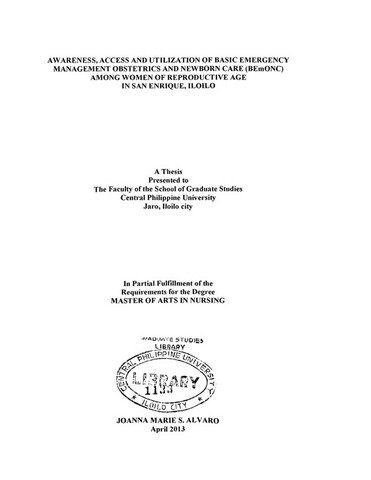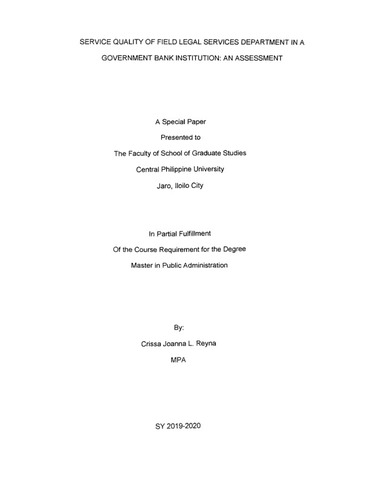Clients’ post-abortion utilization of and perceived needs from local health services of two villages in Bacolod City, Negros
| dc.contributor.author | Espina, Christine Renee A. | |
| dc.coverage.spatial | Bacolod | en_US |
| dc.date.accessioned | 2021-09-01T05:25:15Z | |
| dc.date.available | 2021-09-01T05:25:15Z | |
| dc.date.issued | 2004 | |
| dc.identifier.citation | Espina, C. R. A. (2004). Clients’ post-abortion utilization of and perceived needs from local health services of two villages in Bacolod City, Negros (Research report). Jaro, Iloilo City: Social Science Research Institute, Central Philippine University. | en_US |
| dc.identifier.uri | https://hdl.handle.net/20.500.12852/1343 | |
| dc.description | Abstract only | en_US |
| dc.description.abstract | Induced abortion is generally restricted in the Philippines, although it may be permitted to save the mother’s life. The stigma associated with abortion often outweighs the perceived need to seek professional medical care. The goals of this study are: 1) to describe women’s experiences with abortion by type of abortion; 2) to obtain a profile of women who have undergone induced abortion; 2) to determine the number of women who used health care services post-abortion; 3) to know the types of health care services provided to a post-abortion client; 4) to determine the client’s reasons for not seeking or receiving medical treatment; 5) to determine what reasons the women had induced abortion; 6) to describe women’s feelings and coping strategies after their experience with induced abortion; and 7) to describe the women’s perceived needs from health care services. Forty-two clients in two barangays (villages) in Bacolod City, Negros were interviewed in-depth. The majority of the respondents were 38-40 years old, married, high school educated, unemployed, Roman Catholic, and had three or four biological children and her husband/male partner living at home. Over half of the clients (54.8%) reported experience with induced abortion. Of those who had induced abortion, less than half of those who had induced abortion (47.8%) reported hospital or professional medical treatment post-abortion. Of all the respondents, 50% went to a hospital or private clinic post-abortion (either induced or spontaneous), and fourteen women (58.3%) reported no other services were offered to them such as post-abortion counseling, family planning education, or reproductive health education. Most respondents reported the reasons for induced abortion were unwanted pregnancy and economic/financial reasons. Many of the women stated that they coped with the abortion by “relaxing and resting.” The majority of women perceived they needed medications and personal health advice and education after an abortion from health care services. A need for improving accessibility of health and community resources exists. Health care providers need training in post-abortion care. Findings show a need for community education on abortion, family planning, and contraceptive options. The abortion incidence needs to be discussed and addressed by policy makers, health care providers, and the community alike to confront the growing incidents of unsafe clandestine abortions. | en_US |
| dc.description.sponsorship | Philippine-American Educational Foundation, Social Science Research Institute of Central Philippine University, and Parola Outreach and Development, Inc., Bacolod City | en_US |
| dc.format.extent | viii, 70 leaves | en_US |
| dc.language.iso | en | en_US |
| dc.subject.ddc | GSL Theses 610.73072 Es65 | en_US |
| dc.subject.lcsh | Abortion | en_US |
| dc.subject.lcsh | Abortion services | en_US |
| dc.subject.lcsh | Women | en_US |
| dc.subject.lcsh | Reproductive health services | en_US |
| dc.subject.lcsh | Reproductive health services--Utilization | en_US |
| dc.subject.lcsh | Abortion services--Utilization | en_US |
| dc.subject.lcsh | Philippines--Bacolod | en_US |
| dc.title | Clients’ post-abortion utilization of and perceived needs from local health services of two villages in Bacolod City, Negros | en_US |
| dc.type | Technical Report | en_US |
| dcterms.accessRights | Limited public access | en_US |
| dc.description.bibliographicalreferences | Includes bibliographical references | en_US |
| local.subject | Post-abortion care | en_US |
Files in this item
This item appears in the following Collection(s)
-
Research reports [167]





